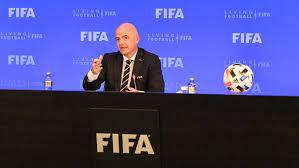FIFA is burying a plan to hold a World Cup every two years, which will not be discussed at the global body's annual congress this week, and leaders are now looking for other ways to showcase top national teams.
While no “concrete talks” have been started, regional confederations are considering a new version of the Confederations Cup featuring teams from Europe and South America, according to a source close to the negotiations.
An idea to enlarge Europe’s League of Nations to take in South American countries has also been mooted, sources said.
Talks are expected on the sidelines of the FIFA Congress to be held on Thursday in Doha. But the alternatives are moving slowly as FIFA’s agenda is dominated by sanctions imposed on Russian football after the country’s invasion of Ukraine.
Russia has been expelled from the race to secure places at this year’s Qatar World Cup. Members will be called upon to back the exclusion at the congress.
The biennial World Cup has been left off the agenda, with only changes to the women’s football calendar scheduled for a vote by the 211 member associations.
FIFA president Gianni Infantino had proposed holding a world championship every two years from 2026.
While Africa and Asia was tempted, the European and South American federations came out strongly against.
Even the International Olympic Committee expressed concerns about the competition calendar and Infantino’s references to two years have dried up.
“It will never happen,” one top football official told AFP, on condition of anonymity.
UEFA president Aleksander Ceferin said this month that a biennial World Cup was a “no go” and that FIFA recognises this.
FIFA launched a massive campaign to persuade its members that a World Cup every two years would bring them extra cash and prestige.
In December it promised an extra 19 million dollars every four years for each national federation while its “solidarity” payments would “potentially” rise from six to 25 million dollars — if the reform was passed.
FIFA denied it was simply aiming to make more revenue, however, insisting that it would give more chances for players to shine on the world stage, while being organised with fewer breaks in national championships.




